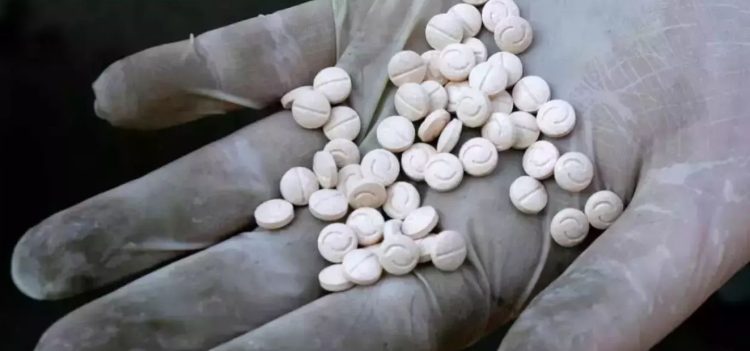Captagon’s stimulant effects, coupled with its ability to suppress fear and pain, have made it a tool of war and addiction. Its use by both militants and civilians across the Middle East underscores its devastating impact on the region.
Is It in the US?
Captagon is not widely used in the United States, and there are several reasons for its absence from the American drug market. First, Captagon has been classified as a Schedule I controlled substance in the U.S. since 1981, meaning it is considered to have no accepted medical use and a high potential for abuse. It’s not approved for any legitimate medical purposes, which limits its availability. This, however, hasn’t lessened the popularity of heroin, meth, and a host of other dangerous drugs.
Second, Captagon is primarily produced and trafficked in the Middle East and parts of Europe, leaving it with very little presence in North America.
It’s a drug that most American users have likely never even heard of.
Additionally, major sources of amphetamines in North America, such as Mexican cartels, are not manufacturing or distributing Captagon, focusing instead on other drugs like methamphetamine.
The market for Captagon is almost entirely concentrated in the Near and Middle East, with some expansion into Europe. This regional focus makes it unlikely to appear in significant quantities in the United States.
Although Captagon itself isn’t an issue in the U.S., there is concern about the rise of counterfeit prescription stimulants. Pills pressed to look like legitimate medications, such as Adderall or Ritalin, sometimes contain dangerous synthetic stimulants. While not the same as Captagon, these counterfeit drugs pose a growing risk, and authorities are closely monitoring the situation to prevent their spread.
Assad’s Captagon Empire
When it comes to the industrial production of captagon, all roads lead back to Syria. Under Bashar al-Assad’s regime, Syria became the global hub for captagon manufacturing and export. It wasn’t a side hustle—it was a critical piece of the regime’s strategy to stay afloat amidst international sanctions and a crumbling economy.
Here’s how it worked: Production facilities—often disguised as pharmaceutical labs—are scattered throughout regime-controlled areas. The Syrian military and intelligence apparatus oversee the operation, working hand-in-glove with smugglers to move the product across borders. From there, captagon pills find their way to markets across the Middle East, particularly in Saudi Arabia, which accounts for a massive share of the demand.
To put it bluntly, Captagon has become Assad’s golden goose. In 2021 alone, the captagon trade was estimated to be worth billions, dwarfing Syria’s legitimate exports. It’s a chilling irony: the same drug that fueled chaos and conflict in Syria was also propping up the regime responsible for much of that chaos.
The Future of Captagon
With the fall of Assad’s regime in Syria in December 2024, the future of the country’s Captagon production and trafficking is uncertain but unlikely to end completely. While efforts to dismantle the trade are underway, several challenges remain that could keep the illicit industry alive.
The new leadership in Syria, led by Ahmed al-Shara, has pledged to tackle the Captagon crisis. Al-Shara, who led the rebel offensive, stated, “Syria has become the biggest producer of Captagon on Earth, and today, Syria is going to be purified by the grace of God.” Rebel forces have already begun destroying Captagon stockpiles, burning and disposing of large quantities of the drug as they uncover manufacturing sites. However, fully eradicating the trade will be an uphill battle.
Many factors make it difficult to eliminate Captagon entirely. The drug has a high street value, making it incredibly profitable for those involved. The ease of obtaining precursor chemicals used to manufacture Captagon, coupled with well-established smuggling networks, creates a system that is hard to dismantle. Even if production slows down temporarily, the infrastructure supporting the trade remains intact.
The economic impact of the Captagon trade also complicates efforts to stop it. At its peak, the industry generated $10 billion annually, with $2.4 billion flowing directly into Assad’s coffers. This massive source of revenue filled the gap left by Syria’s struggling legitimate economy. Now, with Assad gone, the economic void created by the collapse of the Captagon trade might tempt others to continue production as a way to bring in money.
Pressure from regional players could influence how the new Syrian government handles the trade. Gulf states, particularly those frustrated with Assad’s use of Captagon as a bargaining tool during normalization talks, may push for a crackdown on the drug trade. However, the sheer power of a multi-billion dollar drug economy poses a challenge for the fragile transitional government, which may lack the resources and stability to fully control it.
The demand for Captagon in the Middle East remains high, further complicating the situation. Even with recent drug seizures and the disruption of production networks, the market for Captagon is unlikely to disappear overnight. Experts predict that any reduction in production will only be temporary as smuggling networks adapt and seek new opportunities.
The future of Captagon in post-Assad Syria will largely depend on the new government’s ability to resist the economic temptation of the drug trade and establish control over trafficking networks. Regional cooperation and support from neighboring countries will also be critical in addressing the widespread demand and dismantling smuggling operations. Without strong leadership and international backing, the Captagon trade could continue to fuel instability in the region.
Summation
The story of Captagon is a grim reminder of how war, economics, and illicit drugs intersect to devastate societies. As Syria moves forward, the international community must remain vigilant, offering both support and pressure to dismantle the remnants of this deadly trade and prevent it from further fueling instability in the Middle East.










COMMENTS